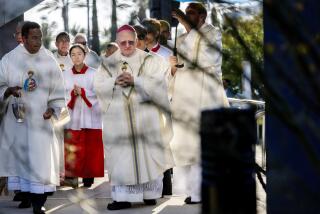Small blessing: Time to heal rift after ruling
- Share via
With pain, joy, anger and in some cases, relief, Episcopalians across the nation reacted Tuesday to a stern directive from Anglican leaders that the American wing of the church refrain from sanctioning blessings for same-sex unions and take other steps to heal tensions that may yet splinter the global Anglican Communion.
In a crucial meeting in Tanzania that ended Monday, Anglican leaders gave the U.S. Episcopal Church until Sept. 30 to state unequivocally that its bishops will not authorize blessings for homosexual couples and will stop consecrating gay bishops.
The three dozen Anglican leaders, or primates, also set up a special council and vicar to oversee, at least temporarily, conservative American dioceses that have rebelled against the Episcopal Church’s relatively liberal views on homosexuality and Scriptural teachings.
Many conservatives said they were happy that the primates had given the divided U.S. branch of the church an ultimatum; many liberals expressed sadness.
Others wondered if the demands made this week would push the historic Anglican Church, founded by King Henry VIII of England after he broke with Catholicism, toward a schism -- or help save it from such a fate.
“No one should underestimate the depth of the divisions,” said John C. Green, a senior fellow at the Pew Forum on Religion & Public Life in Washington, D.C.
“Looking at the subtext here, you can see the threat if a resolution isn’t found. But at the same time, there appears to be a real effort not to have that happen,” Green said.
Conflict between liberal and orthodox church members in the United States and abroad reached crisis in 2003 when the Episcopal Church consecrated its first gay bishop.
The tensions with conservatives grew last year when the American church elected a woman, Katharine Jefferts Schori, as presiding bishop.
Late Tuesday, after her return to the United States from Dar es Salaam, Jefferts Schori released a statement asking church members for patience and understanding as they -- and the institution itself -- seek solutions to the thorny issues before them. The text appears at episcopalchurch.org.
In calm, measured language, Jefferts Schori noted that the Tanzania meeting’s final communique had made requests not just of the U.S. church, but of conservative bishops outside the United States, who have taken dissenting Episcopal parishes and dioceses under their auspices. They were asked to refrain from that practice.
“Each party in this conflict is asked to consider the good faith of the other, to consider that the weakness or sensitivity of the other is of significant import, and therefore to fast ... for a season,” Jefferts Schori wrote.
Not all seemed inclined to obey the request to pause.
At Pasadena’s All Saints Episcopal Church, an influential, liberal congregation, the Rev. Ed Bacon said his church would still bless same-sex unions.
“We have many people very concerned about whether All Saints will be intimidated by this, but we will continue our ministry with pastoral care, compassion and justice,” Bacon said.
On the other side, the Rev. Praveen Bunyan, whose St. James Church of Newport Beach broke away from the U.S. church in 2004 to join an Anglican province in Uganda, said he was encouraged to see the primates “give the Episcopal Church one last chance to turn around.”
“These are heavy, serious times, and we are not jumping up and down screaming, ‘Hoorah for our side!’ ” said Bunyan, who was reached by telephone in Uganda. “The primates are consistent with the authority and clear teachings given to us in Scripture. If there is no consistency in Scripture, then there is no consistency with God.”
Others said the sight this week of a small group of theologically conservative African leaders giving the U.S. church what many viewed as an ultimatum raised broad and troubling questions about power and authority in the Anglican Communion.
“This isn’t fundamentally about sexuality or the place of gays and lesbians in the church,” said the Rev. Ian T. Douglas, a professor at the Episcopal Divinity School in Cambridge, Mass.
“It’s more about questions of identity and authority in a church that has moved from a monocultural Anglo-American alliance” to a church membership and power shifting to Africa, Asia and elsewhere.
The recent meeting, he said, laid bare the deep divisions in Anglicanism between those who place power and authority in the hands of its bishops and those who prefer a more democratic, consultative church.
Meanwhile, many on both sides of the issues appeared to be questioning the role in the widening dispute of the Archbishop of Canterbury Rowan Williams, the Anglican Communion’s spiritual leader.
Bill Countryman, a professor of the New Testament at Church Divinity School of the Pacific in Berkeley, expressed concern about Williams’ response to the more conservative primates, men Countryman described as “bullies.”
“Rowan hasn’t done much of anything, and no one can figure out why,” said Countryman, who is openly gay.
The Rev. Van McCalister, a spokesman for the Fresno-based conservative San Joaquin Diocese, which is trying to move away from the Episcopal Church, expressed similar concerns.
“Both sides are asking where Rowan Williams is in all this” McCalister said.
*
louis.sahagun@latimes.com
Times staff writer K. Connie Kang contributed to this report.
More to Read
Sign up for Essential California
The most important California stories and recommendations in your inbox every morning.
You may occasionally receive promotional content from the Los Angeles Times.











